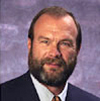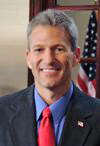About Us
Meet the Growers for Biotechnology directors

Bruce Freitag, Chairman
Bruce Freitag operates a diversified operation in southwest North Dakota near Scranton. The operation is 100% no-till and raises durum wheat, corn, field peas, lentils, and occasionally spring wheat, sunflower, canola, and flax. Prior to coming back to the farm, he earned a degree in Mechanical Engineering from North Dakota State University. Bruce has served nine years on the North Dakota Grain Growers Assn. board including two years as President. He also served as a director on the National Association of Wheat Growers (NAWG) board of directors. He currently serves as a member of the North Dakota Wheat Commission, on the executive committee of the North Dakota Ag Coalition, and Treasurer of the Bowman County Farm Bureau.
Why is this important to him? – “Biotechnology holds the key to unlocking new advancements in plant breeding. As a producer I believe it is important we stay on the cutting edge of technology to remain competitive in the world. Biotechnology is simply one more tool to use on our endless quest for efficiency.”

Jeff Topp, Producer-Director
Jeff Topp is in partnership with his father and brother and overseas the day-to-day needs of their diversified operation. In addition so spring wheat and durum, Topp raises flax, barley, corn, soybeans and sunflowers. Topp services as a county director to the North Dakota Wheat Commission and is on the Board of Directors of Dakota Grain.
Why is this important to him? – “Consumer needs have shifted from a dietary perspective which has some negative impact on the wheat industry. Biotechnology offers the ability for producers to help meet those consumer demands, in addition to raising crops to improve our health and lifestyle.”

Paul Aasness, Producer-Director
Paul Aasness and wife Phyllis farm in West Central MN near Fergus Falls along with son, Peter, his wife Katie and family. Although for many years the farm included a feed pig operation, now the farm is entirely a grain operation raising corn, soybeans and wheat. Paul is a former Minnesota State Representative from 1978-1982. He served nine years as a director of Minnesota Wheat Research and Promotion Council and two years on the board of the US Wheat Associates.
Why is this important to him? – “We have experienced first-hand significant benefits from biotechnology on our farm in corn and soybeans. The potential benefits for wheat production are yet to be realized. Research and development are essential and must move forward.”

Terry Wanzek, Producer-Director
Terry Wanzek partners with his father and brother to run TMT Farms near Jamestown, North Dakota. They raise spring wheat, dry beans, corn, soybeans and barley, and also operate a seed cleaning plant and bulk processing facility for beans. Terry is a former State Senator and chaired the Senate Agriculture Committee while in office.
Why is this important to him? – “Farmers are natural-born innovators. We look for better ways to do your job and make us more efficient and profitable. Biotechnology holds such promise for further innovation not just for farmers but also for all segments of the food chain. Access to those innovations is vital to our survival.

Mike Waters, Producer-Director
Mike Waters manages a no-till farming operation that runs spring wheat, durum, barley and peas, near Froid, Montana, with this wife, daughter and son-in-law. His family has been involved in agriculture around the area since early 1900s and Mike is also an accountant.
Why is this important to him? – “Farming combines enjoying the lifestyle this area brings, with a job I love to do. But as I see more and more young people leaving farming and not coming back, I wonder what the future holds for the wheat industry. Biotechnology can deliver the opportunity for the next generation to be productive and successful in agriculture.

Larry Diedrich, Producer-Director
Larry Diedrich is the owner/operator of crop and livestock farm near Brookings, South Dakota. His raises corn and soybeans. He was President of the American Soybean Association, 1993-1994; Chairman of the Board, American Soybean Association, 1994-1995; Executive Committee Member, American Soybean Association, 1990-1991/1992-1995. He also served in the South Dakota House and Senate. Diedrich’s operation serves as a research site for SDSU in the area of Global Positioning Satellite systems and various farming practices.
Why is this important to him? – “From the moment of commercial release of biotech, I have personally recognized how it benefits my farm by lowering costs, increasing yields and allowing me to farm in a more environmentally safe manner. We have accomplished this by reducing tillage, and by cutting herbicide and insecticide use. Yet what excites me even more is my confidence that biotech will allow us to produce a safer, healthier product for our customers. It would be unfortunate if we let a minority of people keep this technology from improving the lives of all people around the globe.”

Douglas R. Jones, Executive Director
Douglas Jones of Meridian, Idaho farmed with his father and brother near Twin Valley, Idaho for 35 years in an irrigated row crops operation. The business also did custom work in Idaho, Nevada and Utah as commercial chemical and fertilizer applicators and custom harvesters. Jones served as chairman of the Agricultural Affairs Committee in Idaho during a 20-year career in the Idaho House of Representatives. Jones founded State Agricultural and Rural Leaders (SARL), an international forum for ag policy makers, which annually brings together leaders from legislative bodies to discuss issues relative to agriculture.
Why is this important to him? - “As we strive to continue to provide ample food, fiber, and now fuel, for a growing population it is even more important to use all the best science and technology innovations available. Biotechnology is one of the most effective new tools to achieve these goals.”
